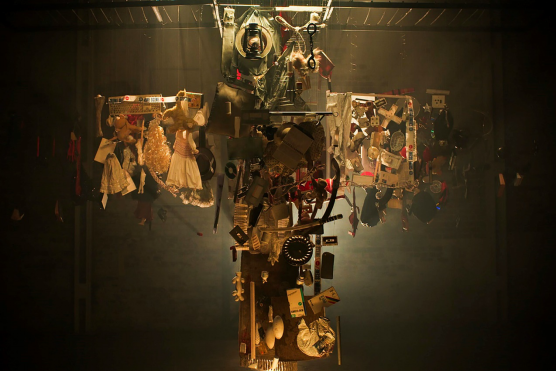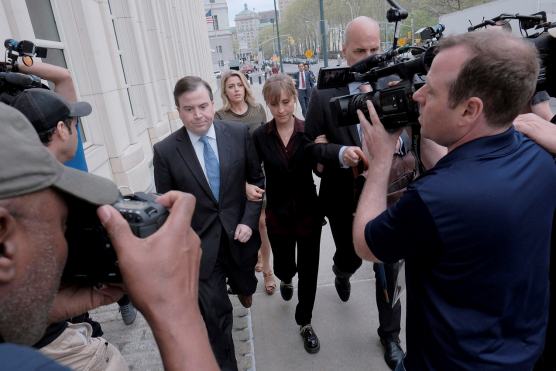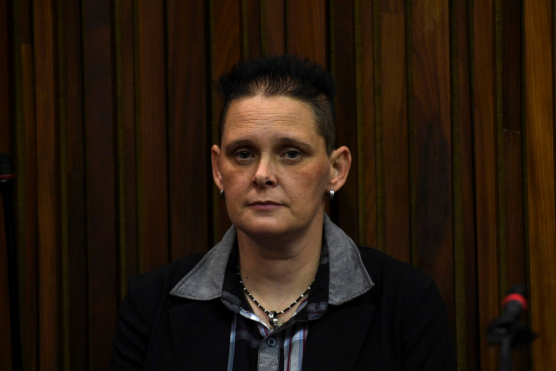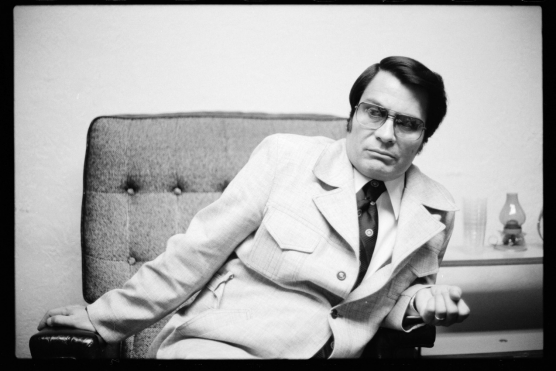
A still from Devilsdorp, a documentary about an extremist christian cult responsible for 11 murders. (Photographs courtesy of Showmax)
Showmax documentary Devilsdorp explores the macabre and murderous story of the religious, extremist sect Electus Per Deus (Chosen by God). Its members were responsible for a trail of mayhem from 2012 to 2016 in Gauteng’s Krugersdorp, which left at least 11 people dead. This group was a breakaway from an earlier group called Overcomers Through Christ, and the parent sect became one of its offshoot’s first targets.
Centred around its unofficial leader, Cecilia Steyn – who told outrageous lies about being a reformed “Satan worshipper” and “42nd generational witch” – the group murdered rival Christians. They also lured real estate agents and financial advisers into traps, murdering them for money and perverse thrills.
As the interviews and archival footage unearthed in the documentary show, Steyn’s reign of terror was enabled by an existing climate of religious paranoia. Fears of the devil and occult conspiracy have long flourished within white conservative social spaces, a paranoia that became increasingly pronounced after the end of apartheid. While the media was quick to dub these “Satanic” murders, they were committed by Christian extremists who justified their crimes as a part of a war against the Devil and his earthly minions.

A still from Devilsdorp showing the Krugersdorp police station.
Steyn convinced her followers that they were doing the Lord’s work by killing “sinners”. Her group attracted establishment figures such as primary school teachers, actuaries and police officers.
Despite her charismatic hold over the group, her followers were not helpless dupes. Her willing hench-people – such as Zack Valentine, whose wife was one of the cult’s victims, and Marinda Steyn – embraced their part in the killings.
As one of the psychologists interviewed in the series suggests, they had “been waiting their whole lives for a Cecilia” to come along and legitimise their most violent desires. They turned a squalid apartment building into a house of horrors, setting out under the cover of darkness to commit murders and robberies.
Toxic power
The Krugersdorp murders, and the bizarre religious subculture from which they emerged, reflect a broader sociological phenomenon of dangerous cults. These have occurred throughout the world and from many different kinds of religious and spiritual belief systems.
The Electus Per Deus group parallels the crimes of Jeffrey Lundgren and the Kirkland Cult, a gang of Mormon extremists in Ohio who brutally executed a family of five in 1989. He told his followers that the murders were an act of “pruning the vines”.
The group’s killings also echo the murders organised by Cuban-born Adolfo Constanzo, the leader of a Mexican cult that killed at least 15 people. A dedicated practitioner of Afro-Caribbean occultism, Constanzo was simultaneously a drug trafficker who believed that human sacrifice conveyed powers – such as invisibility from the police – to his followers. After they were finally caught, the Mexican media dubbed the group Los Narcosatanicos, or “the Narco Satanists”.
Pop culture is fascinated with nefarious cults. Devilsdorp has been released in the wake of a number of cult-focused documentary series, such as Netflix’s Wild Wild Country (2018), about the Hindu-inspired Rajneesh movement, and HBO’s The Vow (2020), which focuses on secular self-help organisation Nxivm and its leader, Keith Raniere.

4 May 2018: Allison Mack arrives at the Eastern District Court in New York City for her bail hearing on sex trafficking charges. (Photograph by Jemal Countess/ Getty Images).
Despite their varying metaphysical beliefs, the former cult members interviewed in these series reveal a similar pattern of radicalisation. They joined groups for personal – sometimes even laudable – reasons before becoming trapped in a cycle of increased dependence and deviance.
The Rajneeshs, for instance, started out as a group focused on meditation and spirituality in a consumerist world, before ultimately performing the largest single act of biological warfare on United States soil.
Nxivm members thought they had found a way to achieve self-actualisation, but were actually part of a sordid personality cult of sex trafficking and sadistic abuse. In the 2000s, the cult worked to recruit celebrities and the super wealthy, including actors from popular television shows such as Smallville and Battlestar Galactica.
Smallville actress Allison Mack has recently been sentenced to prison for aiding Raniere in forcing members into sex slavery. Despite receiving a life sentence, Raniere still commands supporters. Unbelievably, some tried to recruit new members at the jail in which he is currently incarcerated.
What is a cult?
The term cult is often used as a pejorative to describe any groups whose beliefs seem unconventional or eccentric. But as scholars say, many “new religious movements” are benign and do not cause harm to their followers or society at large. Hyperbolic panicking about Satanism and “black magic” are often used to stigmatise alternative belief systems, simply for not adhering to more conventional religious practices.
As sociologist Eileen Barker says in her 1989 book, New Religious Movements: A Practical Introduction, what differentiates dangerous cults from benign ones is that they are based on unquestioning obedience to a single leader, who is considered to have special, even supernatural politics.
These organisations become de facto political dictatorships, where leaders convince their followers to transgress legal and moral boundaries. These leaders and their inner circles create alternative power networks, where they can extort money and time from their followers while deliberately isolating them from friends and family support.
According to Lawrence Wright, whose book Going Clear was the basis for an acclaimed 2015 HBO documentary on the Church of Scientology, dangerous cults are defined by a belief system that inculcates a sense of absolute moral certainty. Cult members are indoctrinated to believe that their leaders are always right, and that abuses of power and criminal delinquency are justified in service of a higher cause.
A number of today’s cults have their origins in the 1960s, when a widespread questioning of social mores led many people to seek out esoteric and new-age belief systems. In many cases, however, groups that seemed utopian and emancipatory soon revealed a far more malignant reality.
Preacher David Berg founded the Children of God on the principle of “free love”. But there have been persistent allegations of child sexual and physical abuse levelled against the group. Actors Rose McGowan and Joaquin Phoenix were raised in this movement.
In an interview, Phoenix describes his family’s experience: “I think my parents thought they’d found a community that shared their ideals. Cults rarely advertise themselves as such. It’s usually someone saying, ‘We’re like-minded people. This is a community.’ But I think the moment my parents realised there was something more to it, they got out.”
In the 1970s, left-wing Christians joined the Peoples Temple led by Jim Jones. The Peoples Temple was widely respected for its racial egalitarianism and the social work it did to aid impoverished people. But behind the scenes, Jones created a sinister personality cult and ultimately convinced his followers to flee to a remote compound in the jungle in Guyana.

28 November 2018: Cecilia Steyn, the unofficial leader of Electus Per Deus, in court. (Photograph by Gallo Images/ Netwerk24/ Felix Dlangamandla).
Jones tried to isolate his followers by claiming that a right-wing junta had taken power in the US and that the Ku Klux Klan was rounding leftists into death camps. After congressman Leo Ryan visited the Jonestown settlement to explore allegations of abuse, Jones had him murdered, before forcing more than 900 of his followers, including many children, to drink lethal, cyanide-poisoned punch. The term “drinking the Kool-Aid” persists as a metaphor for rashly following dangerous authority.
But as journalist Tim Reiterman wrote in his book on the cult, the Peoples Temple followers were not brainwashed sheep. Many were “decent, hardworking, socially conscious people, some highly educated” who “wanted to help their fellow man and serve God, not embrace a self-proclaimed deity on Earth”.
Jones did not simply control his followers with abstract belief, but used fear, isolation and physical violence. Cult power structures entail the leader imposing their will on others, but there is also a feedback loop where the more obedience and veneration they receive, the more empowered they are to pursue extremist ends.
The dangers of obedience
This interplay between supporters and leaders has encouraged some cults to function as virtual parallel states that not only demand active subservience from their followers, but actively try to alter the course of world politics.
One of the most destructive cults in modern history was the Japanese group Aum Shinrikyo (Supreme Truth). Founded by the guru Shoko Asahara, Aum combined Buddhist and Christian beliefs with sci-fi imagery and preached an impending apocalypse. The group specifically recruited scientists and engineers from Japan’s top corporations, along with public servants and police officers.
In the early 1990s, the cult became obsessed with bringing about the apocalypse in the belief that its members would rule the world in the aftermath of nuclear war.
The cultists tried to acquire a nuclear warhead from the former Soviet Union, successfully purchased a military attack helicopter and created a criminal empire that included manufacturing assault rifles and methamphetamine in a compound in the shadow of Mount Fuji. Facing criminal charges, the cult struck back by attacking the Tokyo subway system with sarin gas in 1995, killing 13 people and injuring thousands more.

An aerial view of Krugersdorp from the Showmax series, Devilsdorp.
Historian Howard Zinn said: “Civil disobedience is not our problem. Our problem is civil obedience. Our problem is the numbers of people all over the world who have obeyed the dictates of the leaders of their government and have gone to war, and millions have been killed because of this obedience… Our problem is that people are obedient all over the world, in the face of poverty and starvation and stupidity, and war and cruelty. Our problem is that people are obedient while the jails are full of petty thieves, and all the while the grand thieves are running the country.”
From corrupt police officials to despotic bosses, our societies are full of authority figures who are constantly attempting to bend others to their will. The shocking and bizarre crimes of deadly cults highlight just how dangerous unquestioning obedience to authority can be.
But cult leaders do not simply rule by belief. They use the hopes and fears of their followers to create alternate social realities, where control, exploitation and isolation – sometimes crime and mayhem – are justified in the name of what masquerades as a higher good.

Circa 1976: Peoples Temple leader Jim Jones in his office in San Francisco, California, in the United States. (Photograph by Janet Fries/ Getty Images).
Source:https://www.newframe.com/the-power-politics-of-dangerous-cults/





